Being a responsible pet owner, you need to consider the potential dangers that can cause harm to your furry friend. While some hazards are obvious, such as walking alone on a busy road or handling a blunt, sharp object, certain less apparent dangers, such as dog poisoning, can potentially kill your dog or cause serious health issues. Accidental or forced ingestion of harmful substances such as rodents, heavy metals, human medications, and certain kinds of food can seriously threaten your furry friend’s health and well-being.
Read More: The Right Tricks and Hacks to Deal with Cat Hairballs- March 2023
In case of poisoning, time is of the essence, as a little negligence in recognizing the associated symptoms can put your dog’s safety at risk. This article will explore the ten deadliest poisons that can kill your dog and how to prevent them from ingesting or inhaling these substances.
What is dog poisoning?
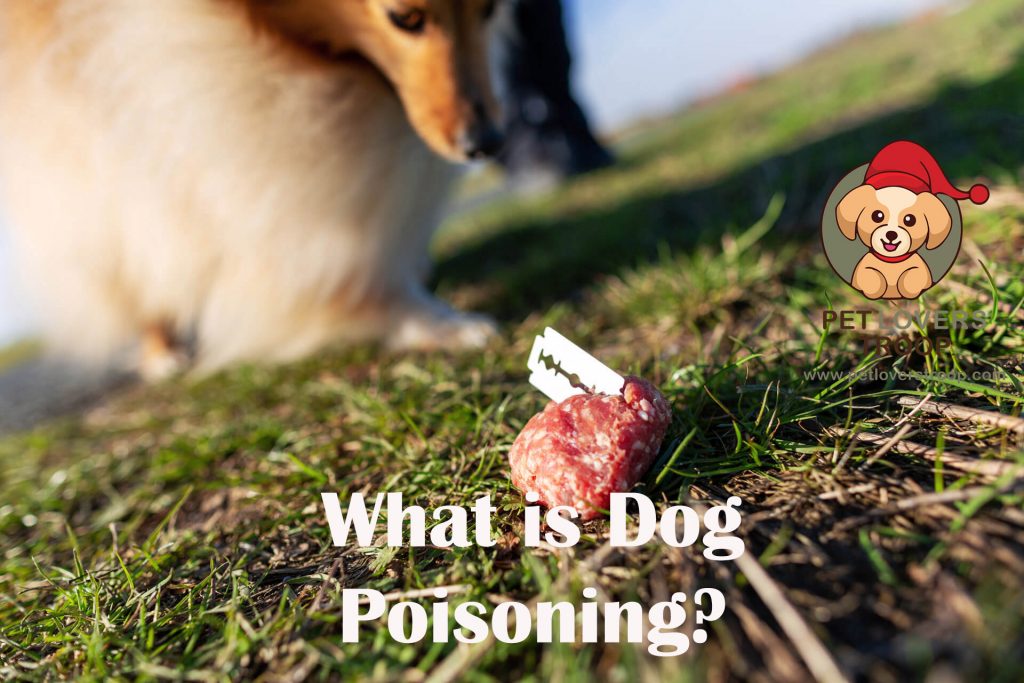
Dog poisoning refers to the harmful consequences resulting from your dog’s intentional or accidental ingestion of toxic substances. The source of this poison can be human food, medications, household cleaning materials, poisonous plants, insecticides, and others.
In a few cases, dog poisoning can be intentional, in a bid to control stray dogs in a neighborhood, seek revenge, or project cruelty towards these innocent beings. Intentional dog killing is a heinous crime and an act of barbarity which, in some countries, can even lead to legal charges against the perpetrator.
As a pet owner, you must be observant and keep your furry animal away from toxic and harmful substances. If you suspect your dog has ingested a poison or any other lethal substance, act quickly and take them to the nearest vet. You can also contact the nearest pet poison control center for guidance. Remember, time is crucial, and any unnecessary delay can even lead to the death of your dog.
Symptoms of dog poisoning
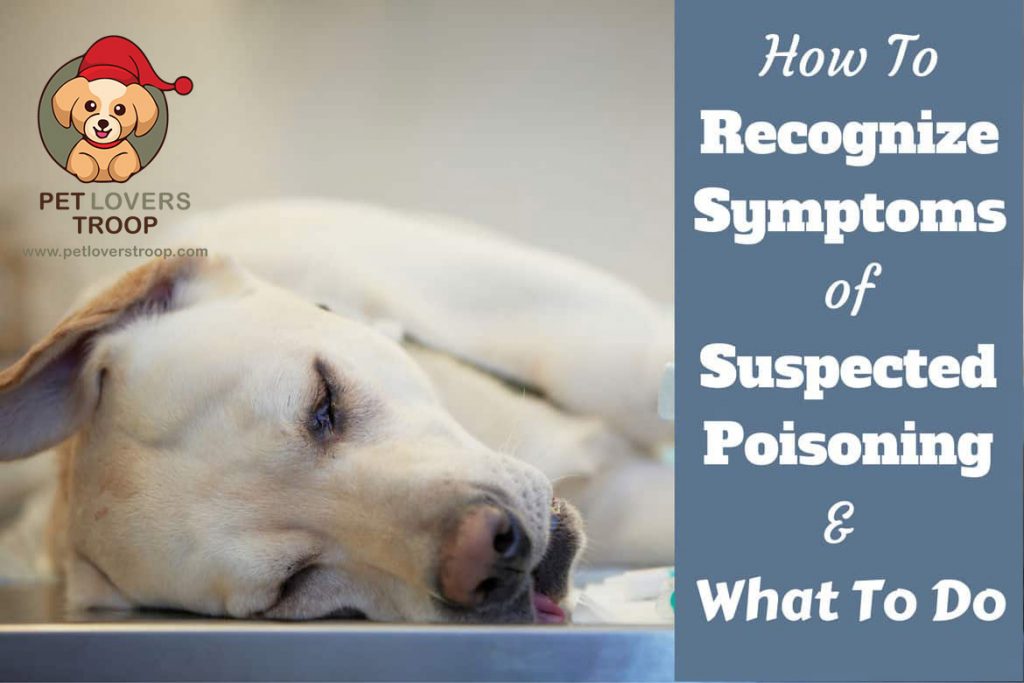
According to an estimate, over 232,000 cases related to pet poisoning are reported in the US, annually. Most of these cases result from ingesting household cleaning substances, which may seem harmless to humans. The overall effects and symptoms of poisoning depend on the substance your dog has inhaled or ingested. Some most common symptoms of dog poisoning include:
- Vomiting
- Seizures
- Loss of appetite
- Lethargy or weakness
- Difficulty in breathing
- Rapid breathing
- Extreme Salivation
- Dry heaving
- Stumbling or uncoordinated body movements
- Blood in feces or urine
- Dilated pupils
- Jaundiced or pale gums
- Increased or decreased urination
- Collapse due to low blood sugar levels
Ten deadly poisons that can kill your dog
As a pet owner, it is your primary responsibility to keep your pet away from toxins and substances that can be dangerous for them. Just because a certain medicine is safe for you and your family does not mean it can also be safe for your beloved pets. Certain substances can be deadly for your dog, even if ingested in small amounts. Following are the ten most dangerous poisons that can potentially kill your dog:
Antifreeze
This sweet-tasting liquid, ethylene glycol, is one of the most common and deadly poisons for your pets. Even a small amount of it can damage your dog’s vital organs and lead to serious health issues such as loss of coordination, vomiting, lethargy, seizures, loss of appetite, kidney failure, and even death.
Rodent poisons
Rodent poisons or rat bait products contain anticoagulant mixes that can lead to fatal bleeding disorders such as blood from the nose, gums, or anus, blood in cough, gastrointestinal issues, problems in breathing, weakness, and other serious health issues. Some common types of rodents can include cholecalciferol and anticoagulant rodenticides.
Read More: Best Dog workouts: Fun daily exercises for your pup to keep them hale and hearty- March 2023
If you suspect your dog has ingested rat poison, immediately take them to the nearest vet. The sooner they are treated, the better the chances they will survive.
Human medications
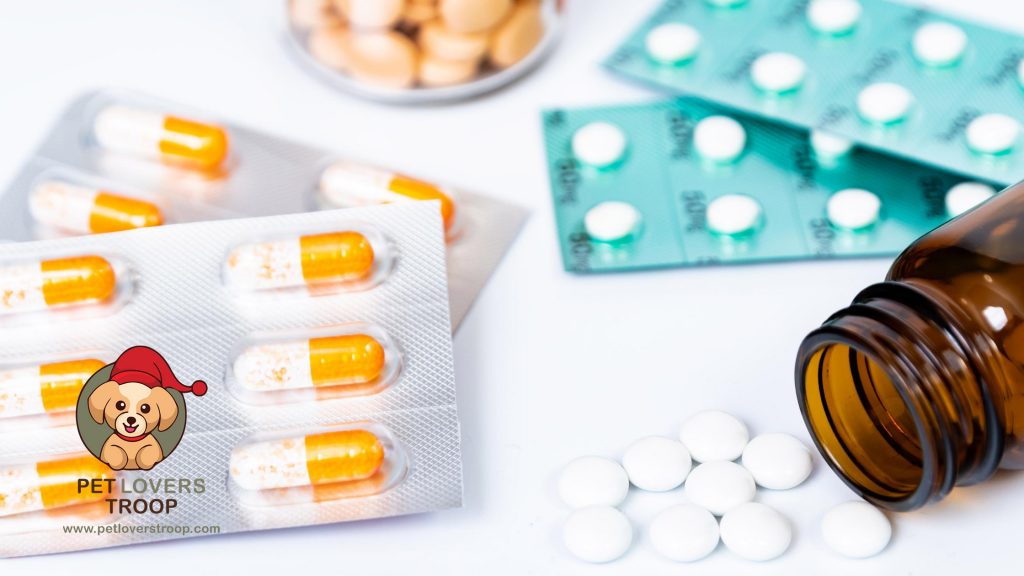
Dogs are often exposed to human medications at home, such as over-the-counter (Advil, Aleve) painkillers, anti-depressants (Celexa), vitamin supplements, and blood pressure medication. These can be lethal for your dog, leading to gastrointestinal issues, liver damage, seizures, tremors, vomiting, coma, and even death.
Insecticides and Pesticides
Unless your vet approves, insecticides can be toxic to dogs and lead to difficulty in breathing, vomiting, seizures, and tremors. Dogs spend more time outdoors and hence can sniff or lick pesticides, while exploring their environment. In extreme cases, pesticides can cause severe gastrointestinal issues, difficulty breathing, weakness, and even death.
Fertilizers
Fertilizers are rich in harmful chemicals such as nitrogen, potassium, and phosphorous, which, if ingested in large quantities, can lead to gastrointestinal issues, difficulty breathing, seizures, coma, and even death. Dogs can be exposed to fertilizers in several ways, such as ingesting them directly, drinking contaminated water, or licking their paws after walking in a fertilized garden.
Household Cleaners
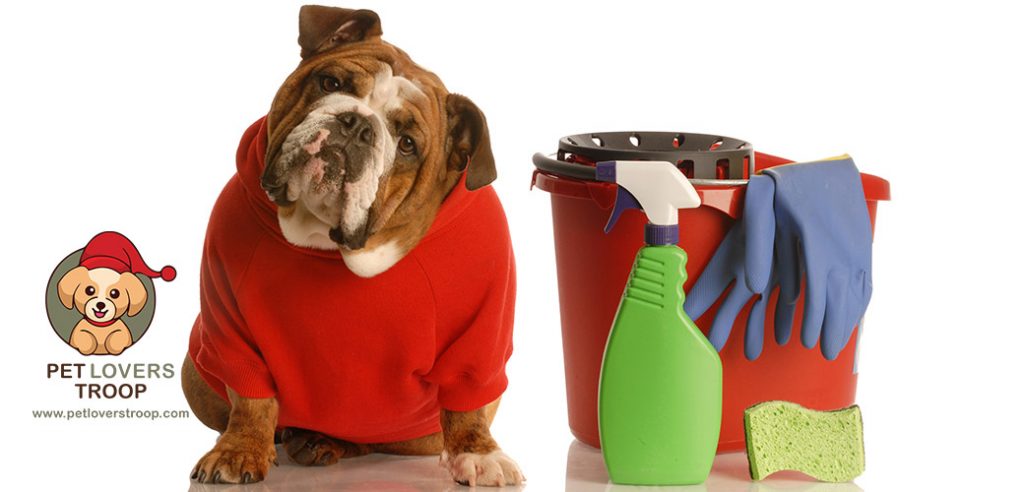
Cleaning supplies, including ammonia, bleach, and drain and toilet cleaners, can be toxic to dogs, resulting in vomiting, difficulty breathing, skin irritation, burns, seizures, and other serious health concerns. Even inhaling some fumes can cause respiratory issues and hence must be kept away from the dog at all cost
Heavy Metals
Metals like zinc, mercury, arsenic, and lead can be lethal for your dogs and lead to neurological and gastrointestinal issues, loss of appetite, seizures, and even coma. These metals can accumulate in their bodies over time and can be lethal.
Human Food
Human food can also be toxic to dogs, leading to serious health concerns. Research indicates that they are one of the leading causes of dog poisoning, after cleaning products. Some of these food items may include chocolate, alcohol, grapes, raisins, macadamia nuts, fruit seeds and pits, onions, and garlic, to name a few.
Read More: Beginners guide to choosing the right birdcage- February 2023
Cigarettes
Like humans, nicotine can pose serious health hazards to your dog. Secondhand smoke can lead to lung problems, difficulty breathing, increased heart rate, low blood pressure, seizures, and gastrointestinal issues. If ingested, cigarette buds can result in choking and nicotine poisoning, which in some cases can be lethal for your dog.
Toxic plants for dogs
If you like plants, you must be aware of the ones that can harm your furry friend. Dogs generally stay away from toxic plants; however, they might nibble on them accidentally or out of boredom or curiosity. Following are some poisonous plants for dogs and their associated symptoms:
- Aloe Vera– results in vomiting, diarrhea, depression, abdominal pain, muscle weakness, and changes in the color of urine
- Autumn Crocus– results in vomiting, seizures, drooling, internal bleeding, and liver and kidney damage
- Azaleas and Rhododendrons– results in diarrhea, vomiting, and even coma
- Black Locust– results in vomiting, diarrhea, abdominal pain, increased urination, and seizures
- Bleeding Heart– results in vomiting, diarrhea, irregular heartbeat, difficulty breathing, and loss of appetite
- Buttercups– results in vomiting, diarrhea, abdominal pain, lethargy, drooling, mouth blisters, irritation or redness around the mouth, and paralysis (in rare cases)
- Castor Bean– results in vomiting, diarrhea, difficulty in breathing, fever, and loss of coordination
- Daffodil– results in salivation, vomiting, low blood pressure, lethargy, abdominal pain, and tremors
- Marijuana– results in loss of coordination, dribbling urine, dilated pupils, lack of energy, vomiting, diarrhea, and fluctuations in heart rates
- Mistletoe– results in vomiting, diarrhea, stomach pain, abnormal heart rate, respiratory issues, dilated pupils, and loss of coordination
- Oleander– results in vomiting, diarrhea, blood pressure changes, dehydration, lethargy, and depression
- Poison Hemlock– results in vomiting, diarrhea, seizures, weakness, difficulty breathing, and dilation of pupils
- Poinsettia– results in mild vomiting, diarrhea, skin irritation, and excessive drooling
- Rhododendrons– results in vomiting, diarrhea, depression, hypersalivation, abdominal pain, loss of appetite, coma, and respiratory issues
- Rhubarb– results in vomiting, hypersalivation, loss of appetite, swollen tongue, and pawing at the mouth
- Sago Palm– results in vomiting, diarrhea, nose bleeding, jaundice, abdominal pain, bruising, coma, and seizures
- Tomato Plant– results in vomiting, diarrhea, lethargy, excessive drooling, loss of appetite, restlessness, and abdominal pain
- Yew– results in vomiting, difficulty breathing, abdominal pain, loss of appetite, coma, and dilated pupils
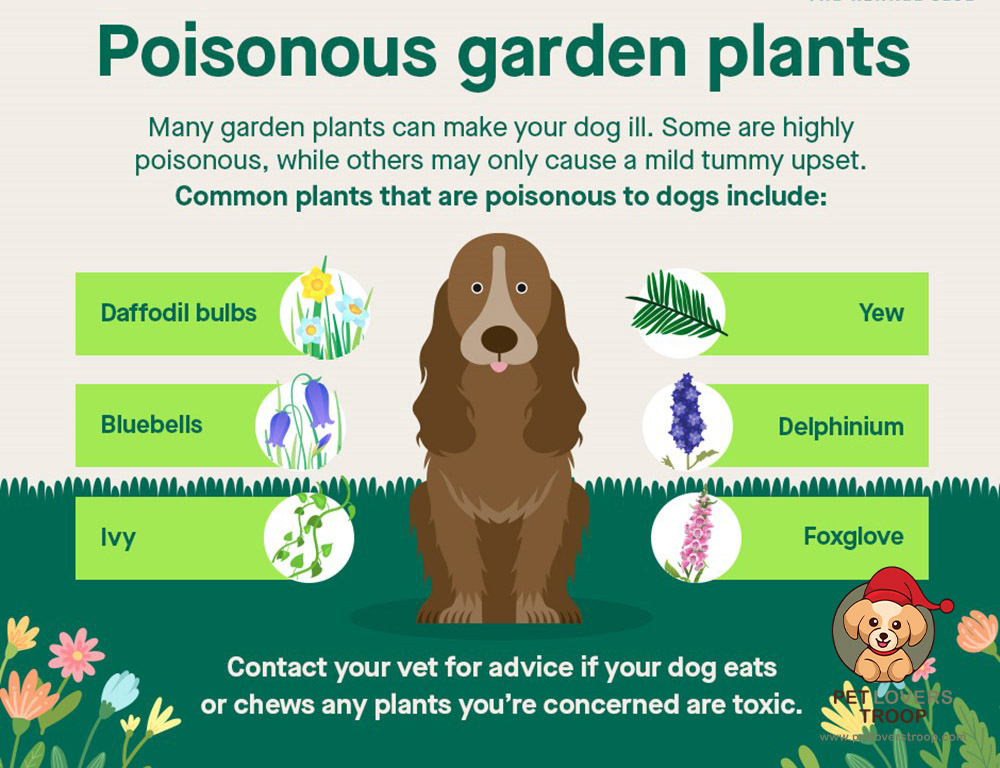
What human foods can cause dog poisoning?
Human foods can be lethal for your furry friend as well. As a pet owner, feeding is an area that you need to be careful about. Giving your pet a little treat might be tempting to make them feel special. However, this treat may contain harmful ingredients that can be lethal for your dog. Following are some food items that can lead to dog poisoning:
Chocolate

Chocolates contain theobromine that can lead to kidney failure, vomiting, seizures, tremors, and even the death of your dog. Beware of dark chocolates as they are richer in theobromine than regular chocolates.
Garlic and Onions
Both garlic and onions contain toxic compounds that can lead to anemia, pale gums, gastrointestinal issues, and red blood cell damage in your dog. These symptoms might not be immediate and may occur a few days after ingestion.
Xylitol (Artificial Sweetener)
Xylitol is commonly used in sugar-free candy, gum, peanut butter, and drinks. This compound can release insulin into hypoglycemia, resulting in low blood sugar levels, liver failure, blood clotting, and seizures.
Read more: Understanding Gastric Stasis in rabbits. How to treat a sick rabbit at home? March 2023
Grapes and Raisins
Raisins are usually added to sweet treats like biscuits, cakes, and cereals. Both raisins and grapes contain an active ingredient that can lead to gastrointestinal issues, lethargy, and liver and kidney damage in dogs.
Avocado
Avocado contains persin in its pit, seed, and fruit, which can cause gastrointestinal issues in dogs.
Macadamia Nuts
Macadamia nuts contain toxins that can negatively impact your dog’s nervous system, leading to increased body temperature, swollen limbs, weakness, excessive panting, and weakness of muscles.
Alcohol

Even a small dose of alcohol can poison your dog and damage the central nervous system, leading to gastrointestinal issues, difficulty breathing, and even death.
Cooked bones
Dogs love their bones; however, cooked bones in large quantities can damage their gut health, leading to worse constipation.
Corn on the cob
Dogs can easily digest corn; however, corn on the cob can be fatal as it can block their intestine.
Read more: Dirty fish tank: How to maintain your fish tank’s hygiene and health? March 2023
The severity of the symptoms may depend on the amount and type of food ingested. If you suspect your dog has consumed any of the food items mentioned above, take them to the nearest vet.
Suspect Dog Poisoning? What to do now?
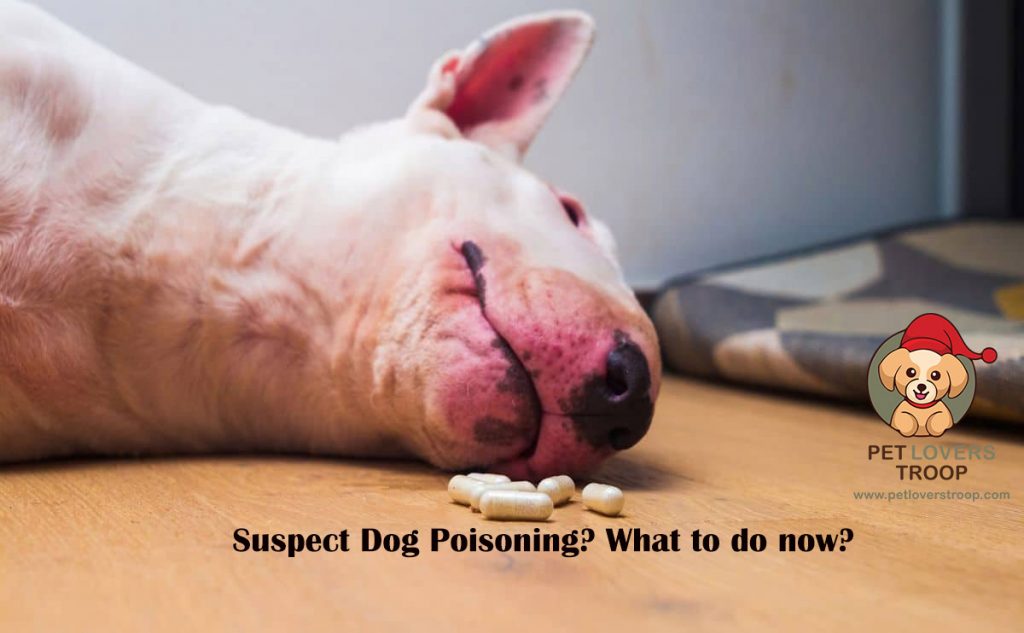
If you suspect your dog has eaten something toxic or poisonous, stay alert and do not lose your calm. Look for obvious symptoms, such as diarrhea, vomiting, seizures, or difficulty breathing. If you observe abnormal behavior, do not hesitate to take prompt action. Keep your dog and family away from the source and read the labels carefully, as the vet might ask you about it to suggest the right. If you suspect the poison is in their fur, immediately wash them thoroughly. Do not use any homemade remedies or antidotes to treat the poisoning. Also, please do not force them to vomit before contacting your vet.
Read more: What to Do if Your Dog Is Poisoned or Exposed to Toxins
You can also reach out to the pet poisoning helpline. Let the representative know that your dog has ingested something poisonous. However, if the representative suggests your dog requires immediate medical intervention, take them to the nearest emergency clinic. Remember, the sooner you take them, the better the chances of their recovery.
Once in the hospital, your vet will suggest a specific treatment for the poisoning, including flushing your dog’s stomach, inducing vomiting, giving dog-activated charcoal, or performing surgery in serious cases. They might prescribe some supportive care such as medicines and IV fluids to heal your dog and help their kidneys and liver process the ingestion’s aftermath.
Most dogs recover within the first two hours of the incident; however, one in 100 poisoned dogs might die despite receiving treatment.
How to prevent your dog from ingesting toxic substances?
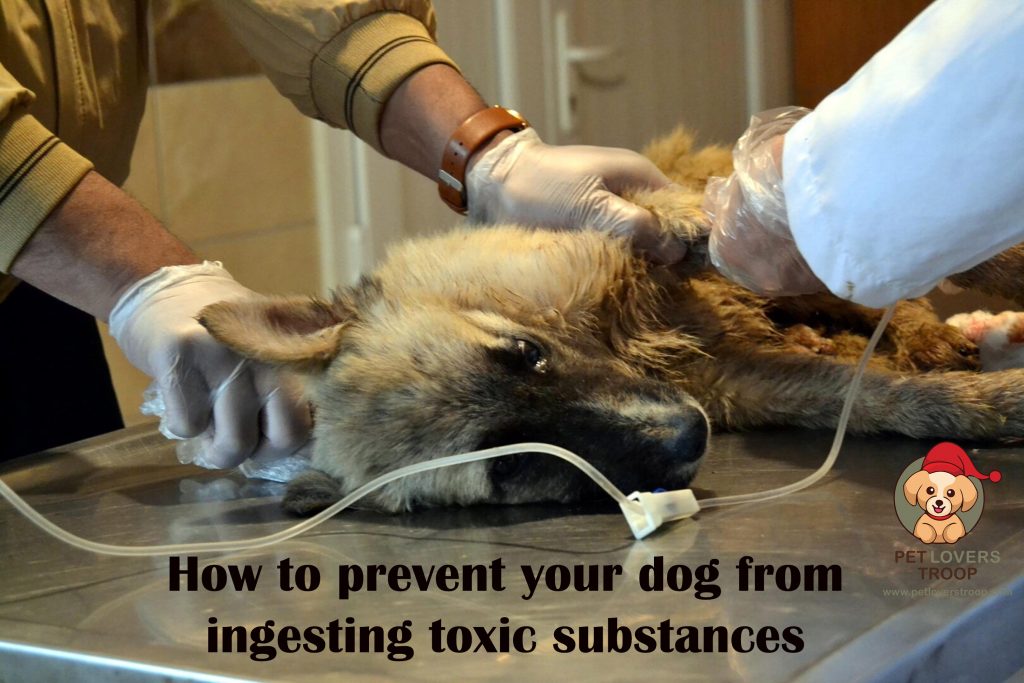
You might have heard that prevention is better than cure. So, if your dog has been involved in a poisoning incident or you want to prevent them from ingesting harmful substances, be extra vigilant. Here is a list of steps that you can take to ensure their safety:
- Keep all types of medicine, cleaning materials, and chemicals out of their reach. Try to place these substances in locked drawers, high cabinets, or in the pantry.
- In air-tight containers, keep harmful foods such as chocolates, onions, avocados, or grapes.
- Closely seal the trash cans to prevent your dog from digging through them.
- Never leave toxic materials on the ground. If you use fertilizers or insecticides in your garden, keep your dog away from these areas until their effects completely disappear.
- Research different plants before adding them to your garden, home, or yard.
- Never leave your dog unattended on a walk; closely monitor them so they do not find anything dangerous on the ground.



